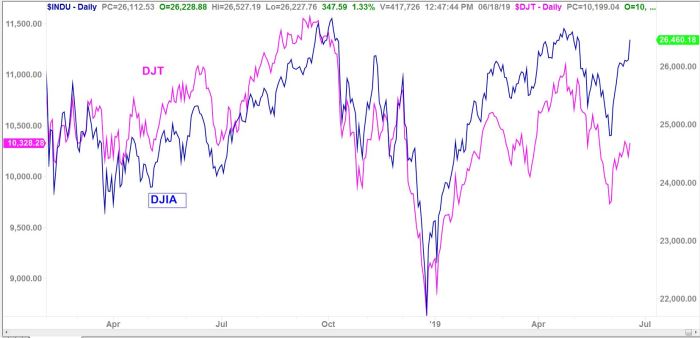Understanding the “DJT Stock Price” Phenomenon

Source: tradingacademy.com
Djt stock price – The perceived volatility of a stock with a name or association similar to “DJT” is influenced by several interconnected factors. These factors extend beyond the company’s intrinsic value and encompass the historical context of company naming, media influence, and public perception.
Factors Influencing Stock Volatility
The volatility of a stock like “DJT” (assuming a hypothetical company with a similar name) isn’t solely determined by its financial performance. Public perception, driven by media coverage and social media sentiment, significantly contributes to price fluctuations. Furthermore, the historical precedent of similar company names and their market performance adds another layer of complexity. Finally, the actions of influential individuals and the spread of misinformation can greatly amplify volatility.
Historical Context of Company Naming Conventions
Throughout history, companies have chosen names to reflect their brand identity, target market, and aspirations. Sometimes, names evoke strong emotions or associations, influencing investor sentiment irrespective of the company’s financial health. The selection of a name, especially one with potential for strong public association, is a strategic decision with long-term implications for market perception and stock performance. The use of acronyms or initials, like “DJT” in this hypothetical example, can further complicate matters due to potential ambiguity and the possibility of unintended associations.
Media Coverage and Stock Price Fluctuations
Media coverage plays a pivotal role in shaping public opinion and, consequently, stock prices. Positive news reports can drive demand, leading to price increases, while negative coverage can trigger selling pressure and price declines. This impact is often independent of a company’s fundamental financial strength. For instance, a controversial statement made by an individual associated with a similarly named company could lead to significant price swings, regardless of the company’s underlying performance.
The 24/7 news cycle and the immediacy of social media amplify this effect, creating a highly reactive market environment.
Comparison of Similarly Named Stocks
| Stock Symbol | 2020 Performance | 2021 Performance | 2022 Performance |
|---|---|---|---|
| Hypothetical Stock A | +15% | -5% | +10% |
| Hypothetical Stock B | -10% | +20% | -15% |
| Hypothetical Stock C | +5% | +8% | +2% |
Note: These are hypothetical examples and do not represent actual stock performance.
Analyzing Public Sentiment and Market Speculation
Understanding public sentiment and market speculation is crucial for analyzing the price movements of stocks, particularly those with potentially controversial names or associations. Social media, rumors, and influential figures all play a significant role in shaping investor behavior and driving short-term price volatility.
Social Media’s Influence on Public Opinion
Social media platforms have become powerful tools for disseminating information, both accurate and inaccurate, about publicly traded companies. Positive or negative sentiment expressed on platforms like Twitter or Facebook can quickly spread, influencing a large number of investors and causing significant price fluctuations. The speed and reach of social media make it particularly potent in amplifying both genuine concerns and baseless rumors.
Rumors and Speculation Driving Price Movements
Rumors and speculation frequently drive short-term price movements, often unrelated to a company’s fundamental value. A false rumor about a company’s financial difficulties, for instance, can trigger a sell-off, even if the rumor is completely unfounded. Conversely, positive speculation, regardless of its factual basis, can artificially inflate a stock’s price. The spread of such information, often through informal channels, highlights the importance of critical thinking and reliable sources when making investment decisions.
Influence of Influential Figures on Market Sentiment
Statements or actions by influential figures, such as public personalities or financial analysts, can significantly impact market sentiment towards specific stocks. A positive endorsement from a respected figure can boost demand, while a negative comment can trigger selling. This influence is particularly pronounced in the case of stocks with a high degree of public interest or those associated with controversial figures.
The power of these endorsements underscores the importance of understanding the broader context surrounding a stock beyond its financial fundamentals.
Hypothetical Scenario: Misinformation and Stock Price Manipulation
Imagine a scenario where a false report claiming a company’s impending bankruptcy is spread through social media. This misinformation, amplified by bots and coordinated campaigns, triggers a panic sell-off, dramatically reducing the stock’s price. Even after the falsehood is debunked, the damage might be done, with many investors suffering losses due to the initial panic. This highlights the vulnerability of markets to misinformation and the potential for deliberate manipulation.
Investigating the Legal and Regulatory Landscape
The legal and regulatory framework surrounding stock market activity aims to protect investors and maintain market integrity. This framework addresses issues like the use of similar company names, information disclosure, and market manipulation.
Legal Ramifications of Similar Names
Using a company name that is deceptively similar to an existing publicly traded company can have significant legal ramifications. Such actions could lead to lawsuits alleging trademark infringement or unfair competition. Regulatory bodies often intervene to prevent confusion among investors and protect the integrity of the market. The legal consequences can range from financial penalties to injunctions prohibiting the use of the similar name.
Regulatory Framework Governing Information Disclosure
Stringent regulations govern the disclosure of material information about publicly traded companies. Companies are required to disclose any information that could significantly impact their stock price in a timely and transparent manner. Failure to comply with these regulations can result in severe penalties, including fines and legal action. These regulations aim to ensure that investors have access to accurate and timely information, enabling informed decision-making.
Regulatory Responses to Past Market Manipulation

Source: fastcompany.com
Regulatory bodies have responded to past instances of market manipulation with increased scrutiny and stricter enforcement. Investigations into manipulative trading activities often lead to significant fines and criminal charges against the perpetrators. These responses aim to deter future misconduct and maintain investor confidence in the market’s fairness and integrity. Examples include cases involving insider trading, pump-and-dump schemes, and the spread of false or misleading information.
Timeline of Significant Events Related to Stock Market Regulation
A timeline of significant events in stock market regulation would include landmark legislation like the Securities Act of 1933, the Securities Exchange Act of 1934, and subsequent amendments aimed at strengthening investor protection and preventing market manipulation. The timeline would also include significant court cases and regulatory actions that shaped the current landscape of market oversight.
Exploring Investment Strategies and Risk Assessment
Investing in volatile stocks requires careful consideration of various investment strategies and a thorough risk assessment. Different strategies suit different risk tolerances, and understanding the inherent risks is crucial for making informed investment decisions.
Investment Strategies for Volatile Stocks
Several investment strategies can be employed when dealing with volatile stocks. These include diversification, hedging, and short-selling. Diversification involves spreading investments across multiple assets to reduce risk. Hedging uses financial instruments to offset potential losses. Short-selling involves profiting from a decline in stock price.
The suitability of each strategy depends on an investor’s risk tolerance and investment goals.
Examples of Successful and Unsuccessful Strategies
Examples of successful strategies include carefully timed investments in undervalued stocks that subsequently rebounded, or the use of hedging techniques to mitigate losses during market downturns. Unsuccessful strategies often involve chasing short-term gains without proper due diligence, leading to significant losses when market sentiment shifts. These examples highlight the importance of fundamental analysis and a long-term investment perspective.
Risks Associated with Speculative Investing
Investing based on speculation rather than fundamental analysis carries significant risks. Speculative trading often involves buying stocks based on rumors or short-term market trends, rather than a company’s intrinsic value. This can lead to substantial losses if the market sentiment changes unexpectedly. A disciplined approach, focused on fundamental analysis and long-term value, is essential to mitigate these risks.
Hypothetical Investment Portfolio
- Conservative Portfolio (Low Risk): High-yield bonds, blue-chip stocks, and diversified index funds.
- Moderate Portfolio (Medium Risk): A mix of blue-chip stocks, growth stocks, and real estate investment trusts (REITs).
- Aggressive Portfolio (High Risk): Growth stocks, emerging market investments, and potentially some speculative investments.
Illustrating Potential Impacts on the Broader Market
The volatility of a single stock, particularly one with high public interest, can have significant ripple effects on the broader market. Market manipulation and negative publicity can erode investor confidence and destabilize the financial system.
Volatility’s Influence on Overall Market Performance
The volatility of a single, high-profile stock can influence the overall market sentiment. If a significant price drop occurs due to negative news or manipulation, it can trigger a broader sell-off as investors become concerned about the overall market health. This interconnectedness highlights the systemic risk associated with highly volatile stocks.
Ripple Effects of Market Manipulation
Market manipulation, such as insider trading or the spread of false information, can erode investor confidence and undermine the integrity of the financial system. The resulting uncertainty can lead to decreased investment, reduced economic activity, and potentially a broader market downturn. Regulatory efforts to detect and prevent manipulation are crucial for maintaining a stable and trustworthy market.
Consequences of Speculative Trading
Excessive speculative trading can contribute to market instability. Rapid price swings driven by speculation, rather than fundamental value, can create a volatile and unpredictable market environment. This volatility can make it difficult for businesses to plan for the future and can discourage long-term investment.
Impact of Negative Publicity on Investor Behavior, Djt stock price
Consider a fictional company, “InnovateTech,” experiencing a major data breach. Negative publicity surrounding the breach leads to a sharp decline in investor confidence, resulting in a significant drop in the company’s stock price. This illustrates how negative news, even if not directly related to a company’s financial performance, can have a significant impact on investor behavior and market valuation.
Detailed FAQs
What is the actual company associated with the term “DJT stock price”?
There is no publicly traded company with the ticker symbol “DJT.” The term often refers to speculation around stocks potentially associated with a particular individual.
How can I protect myself from misinformation regarding stock prices?
Rely on reputable financial news sources, verify information from multiple sources, and avoid making investment decisions based solely on social media or rumors.
Are there legal consequences for manipulating stock prices?
Yes, market manipulation is illegal and carries severe penalties, including fines and imprisonment.
What are some fundamental analysis techniques to evaluate a stock’s true value?
Fundamental analysis involves examining a company’s financial statements, management, industry position, and competitive landscape to assess its intrinsic value.
